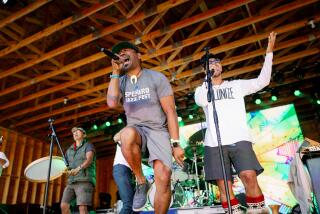Still Small, But Making a Big Comeback
- Share via
My mother was 80 last year when she decided to pass the torch to me, her only daughter--”the torch” being her beloved, well-used Favilla ukulele, accompaniment for family sing-alongs for as long as I can remember.
I wanted to please. But, the ukulele? That comical little has-been guitar-wannabe? Sure it was fun to sing with, and my mother’s expertise always delighted us, but shades of Tiny Tim, doo-wacka-doo, vo-do-de-o, grass skirts and Arthur Godfrey. . . .
It was love at first strum. Not only was cradling that curved, warm mahogany and listening to its mellow, sweet sound a sensory pleasure, but those old songs quickly became a vivid entree into a past not my own.
I was playing, as my mother had--though not nearly as well--the music of her Illinois childhood, of my parents’ courtship, their painful separations during World War II, and their emotion-laden reunions: “Barefoot Days,” “For You,” “Waitin’ for the Train to Come In,” songs to smile at, songs tinged with joy, hope and love.
I made another discovery: I wasn’t alone in this seemingly eccentric pursuit. I had entered the world of ukulele. A subculture, a not-so-secret society of uke players, uke collectors and uke lovers, in which meeting a fellow enthusiast elicits a smile of recognition, like a Mason’s secret handshake.
A world of uke clubs, uke festivals, uke players of all ages, uke lore; of musicians specializing in jazz uke, post-punk uke, Hawaiian uke, Tin Pan Alley uke and British music-hall uke. And surprisingly, a world of the Internet, where Web sites abound, with such monikers as Ukulele Diner, Cool Hand Uke, Uke Trance and Riot Ukes.
A world, in short, where interest in the ukulele is alive and thriving.
Which is where Jim (www.flea-mkt-music.com) Beloff comes in.
Singer-songwriter, former guitarist, uke expert and uke proselytizer, Beloff is the author of “The Ukulele: A Visual History,” published last year. He is also the producer of this month’s Rhino Records’ release, “Legends of Ukulele,” a compendium of uke players spanning 70 years.
It includes a remarkable range of artists: “Wizard of the Strings” Roy Smeck; British superstar George Formby, master of the hybrid “banjulele,” performing his naughty and delightful “My Ukulele”; and Cliff “Ukulele Ike” Edwards (later, the voice of Disney’s Jiminy Cricket).
You’ll also find onetime British pop star, now musical historian and musician Ian Whitcomb; contemporary Hawaiian virtuoso Ohta San; and acoustic bass rocker turned-jazz uker Lyle Ritz, among many.
Beloff, Whitcomb and a host of other accomplished uke lovers will offer a taste of uke virtuosity live in a “Legends of Ukulele” concert Saturday at McCabe’s Guitar Shop in Santa Monica.
“There’s an element of it being kind of kitschy and a novelty and a collectible,” Beloff said. “But there are a lot of people who are beginning to reassess the ukulele as a musical instrument for now and the future.” And not just in Hawaii, “where there’s a uke renaissance happening and a lot of pop artists are now using the uke as their primary instrument.”
“It’s wonderful for someone who doesn’t want to schlep a guitar around, it’s a marvelous first instrument for kids, and it’s amazingly versatile. People who think it just sounds like what Tiny Tim plays,” he added, “are in for an awakening when they hear the variety of sounds that these different artists get out of the same damn four strings.”
Yes, the late Tiny Tim is included in the “Legends” compilation, warbling his signature falsetto hit, “Tip-Toe Through the Tulips,” a song that hit the Top 20 but didn’t do anything for uke hipness.
“With all due respect for Tiny Tim,” Beloff said, “because he had an extraordinary, encyclopedic, passionate knowledge of Tin Pan Alley music--what came through was this extremely strange-looking man playing a uke at a time when the only cool musical instrument in the world was the guitar.”
It’s a big leap from Tiny Tim to Ohta San, “probably the finest technical player today, with a precise quality and a jazz feel; and Roy Smeck, who was a vaudeville star, a brilliant player who brought banjo techniques to the uke.
As for Lyle Ritz, for years an A-list studio musician who played acoustic bass on scores of rock hits, he appears twice on “Legends”: In the title song from Beloff’s own uke album, “For the Love of Uke,” and in “Lulu’s Back in Town,” from Ritz’s recent jazz uke CD, “Time.”
Now a resident of Hawaii, Ritz said he began exploring jazz interpretations of standards and show tunes on the uke in the ‘50s, even before his rock ‘n’ roll bass days.
“It’s such a warm instrument,” he said. “I just love it to death.”
With his 15-year-old daughter now playing, too, Ritz is delighted with the resurgence of interest in the ukulele. “It’s a pleasing surprise. I was just talking to a friend of mine here on Oahu who makes beautiful instruments, and they’re not cheap. He’s selling everything he can make, and one of his buyers is a company in New York.”
Stan Werbin, president of Michigan-based Elderly Instruments, who includes new and vintage ukes in his inventory, concurs.
“Sales are more than they ever have been. Twenty years ago, you couldn’t give them away. Now, some are going for up to $11,000. More commonly, a good instrument can sell for $1,000 to $2,000.”
And this year, for the first time, Werbin pointed out, an electric uke is available.
“The Konablaster electric ukulele. The mere fact that it exists,” he noted, “is a sign of the health of the world of ukulele.”
Another sign are two musicians who have taken the uke a quantum leap from Tiny Tim. San Francisco poet/punk/rock/folk artist Carmaig de Forest is known for his songs’ dark observational themes and his old Gibson ukulele. His latest uke/guitar CD is “El Camino Real,” a tour of Southern California’s seamier side.
Seattle-based Mark Scott, of the Uke Trance punk rock band (two amplified ukes and drums), maintains his Web site, Riot Ukes, to promote and support other uke bands “who use the ukulele not as a freaky sound,” he said, “but because they are drawn to the instrument and feel that’s what they want to use to express their original musical vision.”
Scott, who found his Martin soprano uke in a pawnshop window, has one thing in common with all avid ukers, however: “A ukulele is meant to be played,” he said. “It’s not some museum thing to be collected and stuck on a wall. It’s sort of like that ‘Velveteen Rabbit’ story,” he added unexpectedly. “When it’s worn out, it becomes what it’s supposed to be.”
Beloff makes that point, too. While a decent new starter instrument can be found in the $100 to $200 range, he offers a less costly alternative.
“Ask relatives,” he said. “Ukes were hugely popular in the ‘20s and ‘30s and again in the ‘50s. They sold in the millions. Unless they were all sat on and thrown out, I gotta figure there are a lot of ukes out there in attics.”
In his book, Beloff cites several rock artists who have played the lively little instrument with Portuguese origins, named from the Hawaiian for “jumping flea.” Among them are Joni Mitchell, Tracy Chapman and George Harrison. Indeed, as Beloff notes in his book, in the multi-part film documentary “The Beatles Anthology,” Harrison gives a ukulele performance and Paul McCartney, fondly remembering John Lennon’s uke-playing mother, says, “To this day, if I ever meet grown-ups who pay ukuleles, I love ‘em.”
Ian Whitcomb is a long way from his 1965 orgasmic pop hit, “You Turn Me On.” Whitcomb, producer of the Grammy-winning “Titanic: Music as Heard on the Fateful Voyage,” has made ragtime and Tin Pan Alley songs his specialty--recording them, talking about them, and creating bands to play them. His uke--he calls it “Ukie”--is his signature instrument.
“It’s got what I call a pleasingly plangent sound,” Whitcomb said. “I played it long before my rock days. I found it a wonderful way to keep bullies at bay at school. I’d play them a song, and they’d always smile. So, I’ve just marched backward in time.”
The ukulele, Beloff observed, in all its small to large manifestations--soprano, concert, tenor and baritone--”has all these touchstones to it, all these emotions, even though it is very light and sweet. And the world of ukulele is a nice world.
“I think it’s connected to the fact that, at one time or another in the past, the uke was part of the musical center of some kind of occasion that was happy, when a bunch of people were all singing together. Maybe there’s some desire in us, in the uncertainty of life these days, to remember and re-create moments like that.”
I, for one, will not underestimate the power of uke. My younger brother, a piano and rock/blues guitar player, was recently bitten by the uke bug big time. He’s now salvaging my mother’s 60-odd years of tattered, hand-typed music, collecting vintage ukes in all sizes and playing--along with his wife and children, ages 8 and 12.
Meanwhile, not long after I had inherited it, I had to give back my mother’s Favilla and get my own. Seeing us so enthused, Mum, now 81, decided she wasn’t ready to give up strumming after all.
I’m telling you, the woman plays a mean “St. Louis Blues.”
(BEGIN TEXT OF INFOBOX / INFOGRAPHIC)
Pickin’ and Choosin’ in the Uke World
“Titanic: Music as Heard on the Fateful Voyage,” Ian Whitcomb and his White Star Orchestra, plus the Musical Murrays, Alex Theatre, 215 S. Brand Blvd., Glendale, today, 2 p.m. $10-$23. (800) 233-3123.
“Carmaig de Forest in Concert,” Jacks Sugar Shack, 1707 Vine St., Hollywood, Wednesday, 9:30 p.m. PRICE. (323) 466-7005.
“Ian Whitcomb and His Dance Band,” tunes of the Roaring ‘20s, Workman and Temple Family Homestead Museum, 15415 E. Don Julian Road, city of Industry, Thursday, 6:30 p.m. Free. (626) 968-8592.
“Legends of Ukulele,” the concert, McCabe’s Guitar Shop, Pico at 31st Street, Santa Monica, Saturday, 8 p.m. $15. (310) 828-4403, (310) 828-4497.
Some Ukulele Web sites:
Jim Beloff’s Flea Market Music: https://www.flea-mkt-music.com
Bernunzio Vintage Instruments: https://www.bernunzio.com
Brudda Bu’s Ukulele Heaven: https://www.geocities.com/Napa Valley/Vineyard/1945/
Catch and Release: https://globaluplink.com/cnr/
Cool Hand Uke’s Lava Tube: https://www.oro.net/~dscanlan/
Dave’s Ukulele Roundup: https://home.att.net/~d.newton/
Cliff Edwards Home Page: https://www.mindspring.com/~dgarrick/cliff.htm
Elderly Instruments: https://www.elderly.com/
The George Formby Internet Information Service: https://users.powernet.co.uk/lampost
The George Formby Society: https://freespace.virgin.net/peter.pollard/
Hawaii Ukulele Guide: https://www.ukes.com/link.html
McCabe’s Guitar Shop: https://www.mccabesguitar.com/
Riot Ukes and Ukulele Freedom Front: https://www.speakeasy.org/~marks/riot/uff
Tiny Tim: www.ponk.com/tinytim.htm
Ukulele Diner: https://world.std.com/~syphers/ukediner/
Ukulele Orchestra: https://www.geocities.com/Hollywood/2819/
Ian Whitcomb: https://www.picklehead.com/ian.html#info
More to Read
Sign up for The Wild
We’ll help you find the best places to hike, bike and run, as well as the perfect silent spots for meditation and yoga.
You may occasionally receive promotional content from the Los Angeles Times.






